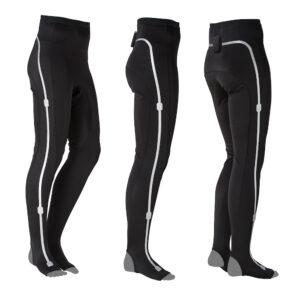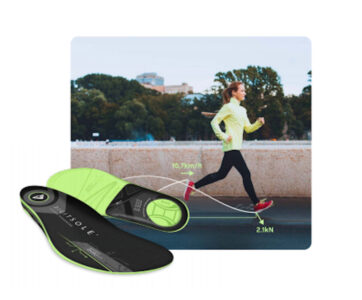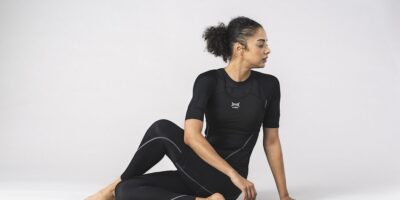Editors Blog – Wearable tech keeps fitness fans in line
For every new year’s resolution to keep fit, there is a sports injury from an over-enthusiastic convert. Monitoring a wearer’s gait and body alignment can help resolve any sport-related issues and improve performance, writes Caroline Hayes.
Here’s a cunning ploy, by Xenoma – increase the effects of light exercise to the levels of a full workout, just by wearing the right clothes. It’s not a case of the latest gym outfits with matching armbands, but the EMStyle clothing range of trousers or one-pieces that have electrodes strategically placed.
The Tokyo-based company will release the e-skin EMStyle Professional workout suit, for gym use, in March, to be followed the following month by the EMStyle Personal home workout suit.
The durable, machine-washable suits are based on Xenoma’s proprietary Printed Circuit Fabric (PCF), stretchable electronics technology.
Figure 2: The EMStyle suit trousers with electrodes placed for muscle stimulation

The suits are fitted with 24 electrodes, strategically placed on the chest, arms, abdomen, glutes and thighs. The electrodes provide electrical stimulation to the muscles and users can control the levels of stimulation through a smartphone app. For professional trainers, up to 20 EMStyle Professional electrical muscle stimulation suits can be connected, for personalised fitness training, while keeping a safe distance from the client to meet Covid distance guidelines.
Xenoma says that wearers can achieve the results of a full body workout in a 20 minute exercise session wearing the cableless, e-skin EMStyle suit. Whether running, jogging, cycling or practising yoga or other exercises, the user downloads the EMStyle app for personalised control of the electrical stimulation. Trainers can access a central control on a tablet.
The EMStyle Professional and Personal suits are both available in six sizes.
The PFC technology and idea of clothing that can be linked to a central hub for control and monitoring has also been adapted by Xenoma for its pyjamas and loungwear ranges of loose fitting tops and trousers. These pieces can be worn by seniors and connected to a central hub, to analyse the wearer’s sleep patterns and sleep quality, automatically adjusting the room’s environment via communication between the pyjamas’ or loungewear’s sensors and a Sleep & Lounge hub, which provides 72 hours of continuous monitoring. In the event of a fall, the sensors can send an automatic alert to a relative or carer’s smartphone app, so they can call to check the wearer is ok or make arrangements for help at the location.
A runaway hit
French start-up, Digitsole says it has transformed footwear into a smart shoe for exercisers. The company produces insoles with sensors to measure up to 10 biomechanical parameters, such as distance, time, calories burned, pace etc), suitable for both runners and walkers.
Figure 3: Digitsole’s insoles relay data to analyse 10 parameters to finesse running/walking styles

3D sensors in the material of the insole, analyse the movement of the foot as the wearer moves.
The company has launched two apps, Walk Active and Run, to offer an overview of the user’s stride analysis and with recommendations to progress on a daily basis. Healthcare professionals can used a handheld device, the Podosmart, to analyse movement in patients, suffering from locomotor disorders, which could be caused by sports injuries. The Podosmart is also helpful for analysing neurological, orthopaedic and age-related mobility difficulties.
The insoles provide data while in motion and over time to analyse mobility. This means that the wearer doesn’t have to keep checking a smartphone screen to check their support, alignment or style.
Digitsole aims to integrate multiple connected applications in a single sole, and for the user to switch between the different apps according to what activity they are doing.
The company says its technology was developed based on the expertise of health professionals. The insole is able to analyse the state of fatigue of the wearer but the app can also be adapted to other applications, for example to detect musculoskeletal injuries or neurological diseases, based on the force and gait of strides.




